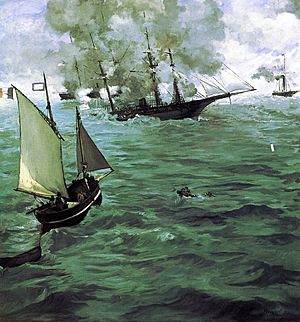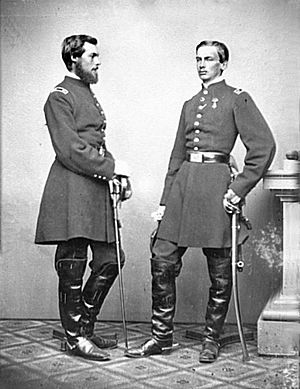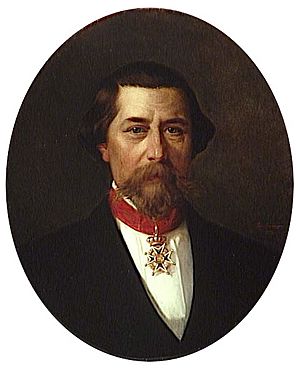France and the American Civil War facts for kids
France stayed officially neutral during the American Civil War (1861-1865). This meant they didn't pick a side between the Union (the North) and the Confederacy (the South). The United States warned France that if they recognized the Confederacy as a country, it could lead to war. France also didn't want to act without Great Britain's help, and Britain decided not to get involved.

Emperor Napoleon III ruled France at this time. He knew that fighting the United States without allies would be very bad for France. However, France's textile industry needed cotton from the South. Napoleon also had an army in Mexico, and the Confederacy could help his plans there. Still, some French leaders, like Foreign Minister Édouard Thouvenel, supported the Union.
French Public Opinion and Economy
French newspapers showed how people felt about the war. Their views often depended on their political beliefs about democracy and Emperor Napoleon III. They also considered who they thought would win the war. Things like slavery or the Trent Affair (which involved Britain) didn't change their minds. Instead, their political views shaped how they saw these issues.
People who supported Napoleon III, along with royalists and Catholic leaders, often supported the Confederacy. On the other hand, those who wanted a republic or a different royal family (the Orléanists) supported the Union.
Between 1861 and 1865, the Union blockade stopped Confederate cotton from reaching French textile factories. Luckily, France had a lot of cotton stored up in 1861. So, serious shortages didn't happen until late 1862. By 1863, the lack of cotton caused a "cotton famine."
Factories in areas like Alsace and Normandy saw cotton prices double by 1862. Many workers lost their jobs. But France found new cotton from India and the Union. The government also started public projects to give jobs to unemployed textile workers. Napoleon wanted to help the Confederacy, but his foreign ministers and many businesses disagreed. They knew that trade with the Union was more important than Southern cotton. The Union bought a lot of French silk, wine, and watches. It also provided important wheat and potash to France. Because of this, economic reasons pushed France to stay neutral.
Government Decisions
The French government saw the American Civil War as a smaller issue. France was busy with many other diplomatic matters in Europe and around the world. Emperor Napoleon III was interested in Central America for trade and wanted to build a canal there. He knew the U.S. was against his plan to create a new empire in Mexico, where his troops landed in December 1861. The Confederacy, however, tolerated his plan.
William L. Dayton, the American minister to France, met with French Foreign Minister Édouard Thouvenel. Thouvenel supported the Union. He helped convince Napoleon not to officially recognize the Confederacy. However, Thouvenel left his job in 1862.
The Confederate representative in Paris, John Slidell, was never officially welcomed. But he offered Napoleon III a deal: if France recognized the Confederacy and sent naval help to break the blockade, the Confederacy would sell raw cotton to France. Some French officials agreed with Slidell. But Britain disagreed, and the Union captured New Orleans in 1862. These events made France decide against the plan. In 1864, Napoleon III sent his trusted friend, Thomas W. Evans, to meet with President Lincoln. Evans convinced Napoleon that the South was going to lose.
Slidell did manage to get a loan of $15 million from French bankers. This money was used to buy ironclad warships and military supplies. These supplies were brought in by ships that ran the Union blockade.
Idea for a Truce
France suggested working with Great Britain and Russia to end the war. They proposed a six-month truce, meaning fighting would stop. The reasons given were the suffering of people in the South and the war's bad economic effects on Europe, especially the cotton market. They also felt the two sides couldn't end the conflict quickly on their own.
Emperor Napoleon III said:
My own preference is a proposition of an armistice for six months, with the Southern ports open to the commerce of the world. This would put a stop to the effusion of blood, and hostilities would probably never be resumed. We can urge it on the high grounds of humanity and the interest of the whole civilised world. If it be refused by the North, it will afford good reason for recognition, and perhaps for more active intervention.
This proposal was printed in French newspapers on November 15, 1862. It came after talks with Confederate and British representatives in October.
Warships
France officially stayed neutral. Because of this, the French government stopped the sale of the ironclad ship CSS Stonewall to the Confederacy in February 1864. Instead, they sold the ship to the Danish navy. However, the Danes refused to buy the ship because of price disagreements. The shipbuilder then secretly sold the ship to the Confederacy in January 1865 while it was still at sea.
France and the U.S. got back to normal diplomatic relations in 1866. France then pulled its troops out of Mexico because of threats from Washington.
 | Audre Lorde |
 | John Berry Meachum |
 | Ferdinand Lee Barnett |



